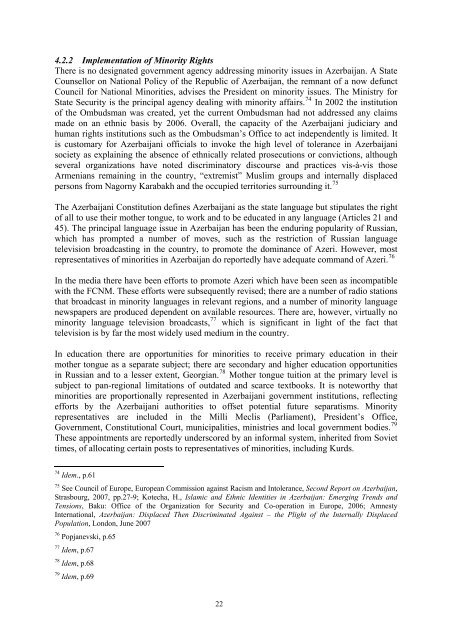The Human Rights situation of the Yezidi minority - UNHCR
The Human Rights situation of the Yezidi minority - UNHCR
The Human Rights situation of the Yezidi minority - UNHCR
Create successful ePaper yourself
Turn your PDF publications into a flip-book with our unique Google optimized e-Paper software.
4.2.2 Implementation <strong>of</strong> Minority <strong>Rights</strong><br />
<strong>The</strong>re is no designated government agency addressing <strong>minority</strong> issues in Azerbaijan. A State<br />
Counsellor on National Policy <strong>of</strong> <strong>the</strong> Republic <strong>of</strong> Azerbaijan, <strong>the</strong> remnant <strong>of</strong> a now defunct<br />
Council for National Minorities, advises <strong>the</strong> President on <strong>minority</strong> issues. <strong>The</strong> Ministry for<br />
State Security is <strong>the</strong> principal agency dealing with <strong>minority</strong> affairs. 74 In 2002 <strong>the</strong> institution<br />
<strong>of</strong> <strong>the</strong> Ombudsman was created, yet <strong>the</strong> current Ombudsman had not addressed any claims<br />
made on an ethnic basis by 2006. Overall, <strong>the</strong> capacity <strong>of</strong> <strong>the</strong> Azerbaijani judiciary and<br />
human rights institutions such as <strong>the</strong> Ombudsman’s Office to act independently is limited. It<br />
is customary for Azerbaijani <strong>of</strong>ficials to invoke <strong>the</strong> high level <strong>of</strong> tolerance in Azerbaijani<br />
society as explaining <strong>the</strong> absence <strong>of</strong> ethnically related prosecutions or convictions, although<br />
several organizations have noted discriminatory discourse and practices vis-à-vis those<br />
Armenians remaining in <strong>the</strong> country, “extremist” Muslim groups and internally displaced<br />
persons from Nagorny Karabakh and <strong>the</strong> occupied territories surrounding it. 75<br />
<strong>The</strong> Azerbaijani Constitution defines Azerbaijani as <strong>the</strong> state language but stipulates <strong>the</strong> right<br />
<strong>of</strong> all to use <strong>the</strong>ir mo<strong>the</strong>r tongue, to work and to be educated in any language (Articles 21 and<br />
45). <strong>The</strong> principal language issue in Azerbaijan has been <strong>the</strong> enduring popularity <strong>of</strong> Russian,<br />
which has prompted a number <strong>of</strong> moves, such as <strong>the</strong> restriction <strong>of</strong> Russian language<br />
television broadcasting in <strong>the</strong> country, to promote <strong>the</strong> dominance <strong>of</strong> Azeri. However, most<br />
representatives <strong>of</strong> minorities in Azerbaijan do reportedly have adequate command <strong>of</strong> Azeri. 76<br />
In <strong>the</strong> media <strong>the</strong>re have been efforts to promote Azeri which have been seen as incompatible<br />
with <strong>the</strong> FCNM. <strong>The</strong>se efforts were subsequently revised; <strong>the</strong>re are a number <strong>of</strong> radio stations<br />
that broadcast in <strong>minority</strong> languages in relevant regions, and a number <strong>of</strong> <strong>minority</strong> language<br />
newspapers are produced dependent on available resources. <strong>The</strong>re are, however, virtually no<br />
<strong>minority</strong> language television broadcasts, 77 which is significant in light <strong>of</strong> <strong>the</strong> fact that<br />
television is by far <strong>the</strong> most widely used medium in <strong>the</strong> country.<br />
In education <strong>the</strong>re are opportunities for minorities to receive primary education in <strong>the</strong>ir<br />
mo<strong>the</strong>r tongue as a separate subject; <strong>the</strong>re are secondary and higher education opportunities<br />
in Russian and to a lesser extent, Georgian. 78 Mo<strong>the</strong>r tongue tuition at <strong>the</strong> primary level is<br />
subject to pan-regional limitations <strong>of</strong> outdated and scarce textbooks. It is noteworthy that<br />
minorities are proportionally represented in Azerbaijani government institutions, reflecting<br />
efforts by <strong>the</strong> Azerbaijani authorities to <strong>of</strong>fset potential future separatisms. Minority<br />
representatives are included in <strong>the</strong> Milli Meclis (Parliament), President’s Office,<br />
Government, Constitutional Court, municipalities, ministries and local government bodies. 79<br />
<strong>The</strong>se appointments are reportedly underscored by an informal system, inherited from Soviet<br />
times, <strong>of</strong> allocating certain posts to representatives <strong>of</strong> minorities, including Kurds.<br />
74 Idem., p.61<br />
75 See Council <strong>of</strong> Europe, European Commission against Racism and Intolerance, Second Report on Azerbaijan,<br />
Strasbourg, 2007, pp.27-9; Kotecha, H., Islamic and Ethnic Identities in Azerbaijan: Emerging Trends and<br />
Tensions, Baku: Office <strong>of</strong> <strong>the</strong> Organization for Security and Co-operation in Europe, 2006; Amnesty<br />
International, Azerbaijan: Displaced <strong>The</strong>n Discriminated Against – <strong>the</strong> Plight <strong>of</strong> <strong>the</strong> Internally Displaced<br />
Population, London, June 2007<br />
76 Popjanevski, p.65<br />
77 Idem, p.67<br />
78 Idem, p.68<br />
79 Idem, p.69<br />
22
















